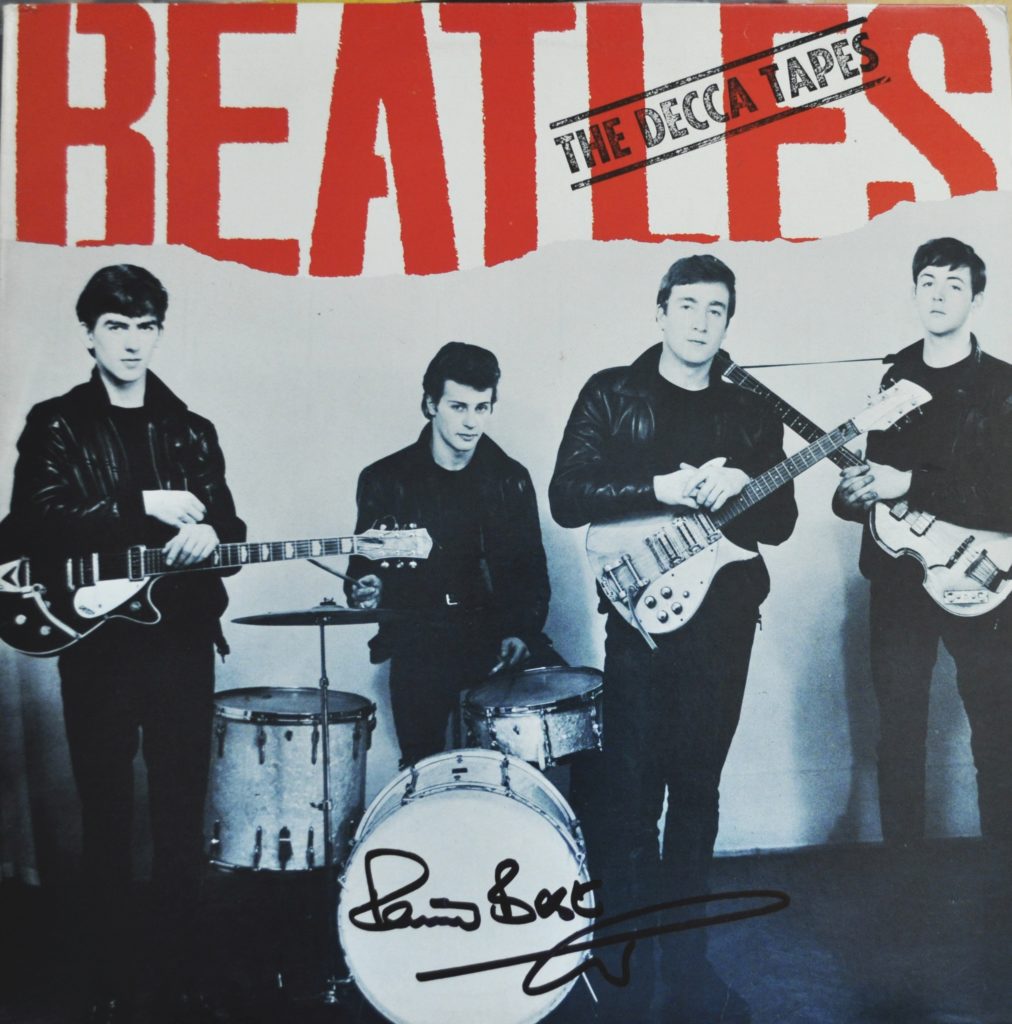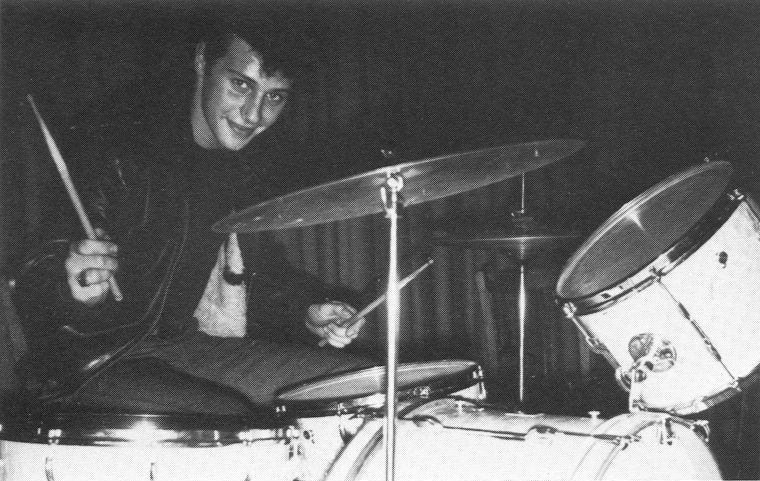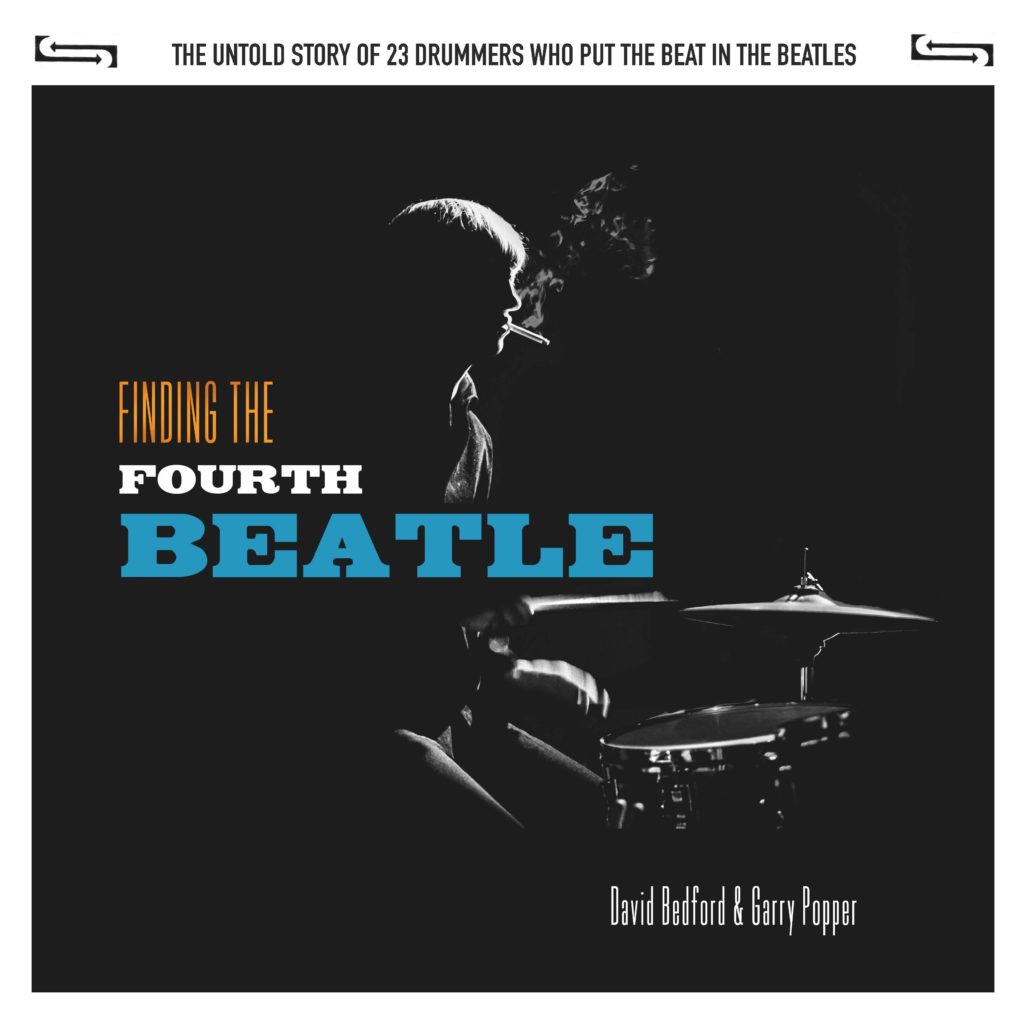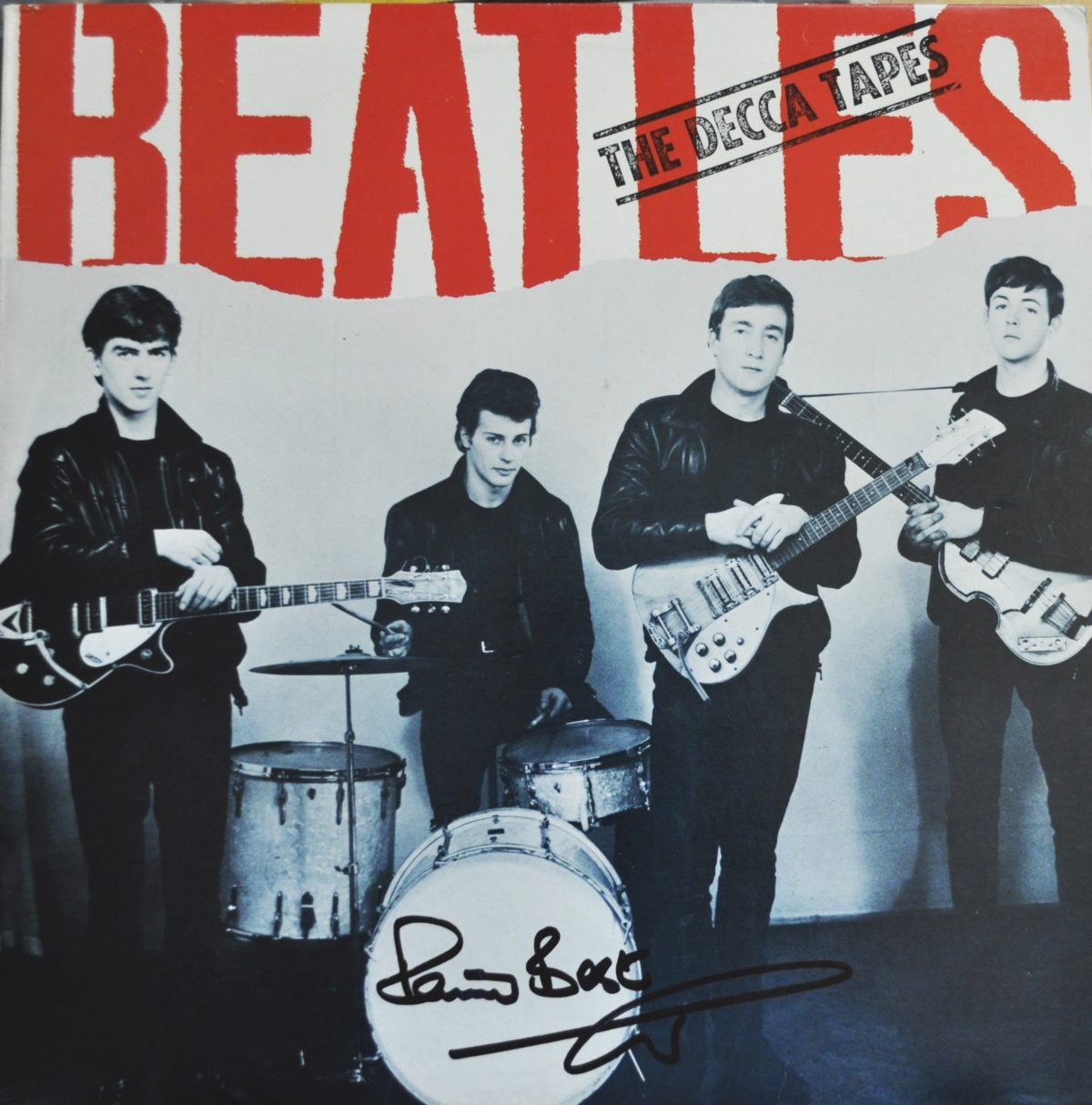
If you missed it, Decca Audition Part 1
The Audition
The Beatles knew it was one of the most important dates of their lives; they still thought they could clown around as if they were in The Cavern. According to George Harrison, they even “put on heavy, thicker-than-usual Liverpool accents to try and fool the Londoners. It was a bit of a defence mechanism.” (True Story of The Beatles)
John Lennon would later say that “somehow this helped get our spirits up again.” Still, despite their best efforts, they were unable to recreate the energy and atmosphere of their Liverpool and Hamburg shows. Johnrecalled: “Remember that we had at the back of our minds that Brian Eppie had spent a lot of time already trying to get record companies interested in us, but without having any luck. I guess that was weighing on our minds.” (True Story of The Beatles)
As if all these pressures were not bad enough, tensions soon rose to the breaking point when Epstein’s sense of self-importance tripped him up once again. Dismissing normal studio protocol, he interrupted he proceedings and immediately got into an open altercation with John Lennon. Oops!
John Lennon and Brian Epstein – A Fair Fight?
The red mist descended over Lennon faster than a rainstorm. Pete Best: “…Brian began to voice some criticism either of John’s singing or his guitar playing. I’m not sure which. Lennon burst into one of his bouts of violent, uncontrollable temper, during which his face would alternate from white to red. ‘You’ve got nothing to do with the music!’ he raged. ‘You go back and count your money, you Jewish git!’” The sudden chill in the studio was far icier than the weather outside. “Brian looked like he had cracked down the middle. Mike Smith, the sound engineers and the rest of us all looked at each other in amazement.” (Beatle!)
Brian wisely walked away from the confrontation. This was likely the first time he experienced a very public tongue-lashing from the often cruel tongue of John Lennon. It wouldn’t be the last, and the fact that it happened at a crucial audition at Decca studios of all places shocked everyone watching. Not the best way to sell yourself.
Would You Have Signed The Beatles?
The final order of the songs performed at the session is not known, but by the end they had managed to record 15 numbers, all live, with little or no opportunity to correct mistakes. Time was up.
Now, decades later, we ask you to put yourself in Dick Rowe’s position. After all the feedback on the day’s events, having listened to the session tapes, and knowing the comparisons and options concerning Brian Poole and the Tremeloes, Rowe had to make a straightforward commercial business decision whether to sign The Beatles or not. There was no crystal ball where he could gaze into the future; nor did he have the luxury of looking back in hindsight.
With that in mind, and based on the known facts, what would you have decided? Would you have signed The Beatles?
Blame it on the Drummer – A Convenient Scapegoat?

These Decca auditions have been cited over the years as proof of Pete Best’s poor drumming and one of the reasons why he had to go. “Worst of all was Pete’s drumming,” and “At Decca, Pete had the full kit at his disposal and did little with it.” (Tune In). But is there any basis in this assessment?
Examining Third Party Opinions: Is Criticism Valid as Evidence?
Writing for Ultimate Classic Rock, Dave Lifton also condemns Best’s drumming. “The tapes prove George Martin’s assertion that Pete Best was the wrong drummer for the group. For years, Best had said he was fired in favour of Ringo Starr because the band were jealous of his success with their female fans. But after one listen, it’s obvious that Best was a limited drummer with a poor sense of timekeeping.”
Savage Opinion
“I thought Pete Best was very average, and didn’t keep good time. You could pick up a better drummer in any pub in London,” recalled Decca session engineer Mike Savage in a 2007 interview. (TuneIn)
Very average and didn’t keep good time? A better drummer in any pub in London? These emotive words condemn Best as a drummer; Savage’s words are savage. In context, Mike Savage was the 20-year-old junior assistant to producer Mike Smith back in 1962. “If you’ve got a quarter of a group being very average, that isn’t good,” (Tune In) he continued. Granted, this is a fair comment.
However, an analysis of the songs will demonstrate that the whole audition was average at best. Applying the scholastic tests, theavage quote, the first by him was given 45 years after the original session, goes against the testimony by many ‘60s-era Liverpool musicians who describe Pete as a very good drummer. There is also no independent corroboration of these comments, and nobody else from Decca, including Mike Smith, commented on Pete’s drumming. We will examine Best’s drumming ability track by track to see if Savage’s assessment holds up.
Analysis by Drummers
For our analysis of the Decca session, we invited three drummers to listen to the audition songs, each for the first time ever. The analysts, which include a father-and-son team, are:
Mike Rice, drummer with ‘60s Merseybeat band The Senators who was an active drummer until recently, and saw both Pete and Ringo play with The Beatles.

Derek Hinton, 50, a guitarist and bassist in bands for over 30 years and an accomplished drummer as well.

Derek’s son Andrew Hinton, 19, an excellent drummer, bass guitarist and lead guitarist who is currently pursuing a music degree at Liverpool University.

Each participant was played the song only once, and was then asked for his immediate feedback on Pete’s drumming as if they were at the session.
Here is a selection from the book, Finding the Fourth Beatle, where we examined all 15 songs. You can also find every track in the Decca audition on our Finding the Fourth Beatles double-CD.
1. “Money (That’s What I Want)“
John launched into a rocking version of “Money (That’s What I Want)”, a 1960 hit for Barrett Strong on the Tamla label. Written by Tamla founder Berry Gordy and Janie Bradford, it became the first hit record for Gordy’s Motown label, whose roster included all the great American pop-soul artists The Beatles worshipped. John seems to be almost croaking, or trying too hard to sound like a rock ‘n’ roller, and overdoes the vocals. Though John’s voice is too raspy, Pete’s atom beat is strong and Paul’s solid bass-playing augments the strong drum rhythm.
This song was later recorded for EMI and issued on their second LP, With The Beatles.
Pete’s drumming?
Mike: “Couldn’t hear Pete enough because the balance isn’t too good between the instruments. Pete’s timing is good and he is playing the correct rhythm for the song, using his bass and floor tom well. Nothing wrong with his drumming.”
Derek and Andrew: “Very good use of the full kit. Very tight and a good tempo all the way through. Drumming is fast and at a good pace with good syncopation.”
3. “To Know Her Is to Love Her“
“To Know Him Is to Love Him” was written by Phil Spector, inspired by words on his father’s tombstone, “To Know Him Was To Love Him”. It was first recorded by Spector’s group, the Teddy Bears, and it went to #1 on the Billboard Hot 100 singles chart in 1958. The Beatles’ version was not officially released until 1994, when it appeared on their Live at the BBC compilation album. The song is in 12/8 time. John’s lead vocal is good, though lacking in the quality we would expect, while the backing harmonies from Paul and George are perfect. Guitars, bass and drums all work together. This is possibly one of the best tracks of the day.
Never recorded by The Beatles with EMI, the song was performed for the BBC and a version was released on Live At The BBC.
Pete’s drumming?
Mike: “I would have added something slightly different, personally, when they go in to ‘Why can’t she see…….’, but that is still good, and the beat is good and regular, and he makes a good transition back into ‘To know, know, know her…’, so I’ve no real criticisms.”
Derek and Andrew: “The timing on the hi-hat is like a metronome, it is that good and regular. He is playing almost freestyle, playing to the song – not just sticking to a set rhythm. He emphasises the melody and song, and doesn’t have a set part to play which is very creative. Maybe needs a little variation with his use of the snare and the ride cymbal.”
4. “Take Good Care of My Baby“
One of the best songs in the day’s repertoire, “Take Good Care of My Baby” came from the famous songwriting team of Carole King and Gerry Goffin. Bobby Vee’s hit version was released in America July 1961 and by September, it had reached #1 on the Billboard Hot 100. In The Beatles’ version, George’s vocal is superb, with John and Paul harmonising with him brilliantly; the group sounds tight.
Not recorded by The Beatles for EMI, the song was performed for the BBC and appeared on Live At The BBC.
Pete’s drumming?
Mike: “Clean and clear sound, Pete’s rhythm is the right one and nicely in time. Good performance.”
Derek and Andrew: “The drumming is very tight, and has a good, consistent tempo. He uses a simpler pattern and rhythm, appropriate for the song. He stops perfectly in time with the rest of the group; the whole group performs this song perfectly. The drumming is holding the group together, and leading from the back. He is very inventive, using a different rhythm for each song, whereas most drummers would just do the same for each song.”
7. “Crying, Waiting, Hoping“
There had to be a Buddy Holly composition included, and they chose “Crying, Waiting, Hoping” a song released in 1959 as the B-side to “Peggy Sue Got Married”. There are actually three versions of Holly’s song: the 1959 release, the 1964 reissue with different orchestration, and Holly’s original home recording.
The Beatles’ Decca version featured George Harrison on lead vocal whilst replicating studio guitarist Donald Arnone’s instrumental bridge note for note. Everything about the song is great. George’s vocal is once again the pick of the session, and the balance of the group’s rhythm is very good.
The number was never an official EMI release by The Beatles, until it appeared on Live At The BBC.
Pete’s drumming?
Mike: “Nice rhythm, good drum rolls at the right place, and variation in the chorus, too. A good performance and sounded great.”
Derek and Andrew: “Again, Pete’s drum rolls are excellent. More variety in his choice of rhythm, with good variation on the snare drum. He is playing a standard 4/4 time signature but with a samba variation. This is where he is listening to the group and playing the song well. It is inventive and precise, with perfect patterns. Stunning performance by Pete, and this is probably the best the whole group has sounded together. They all know what they are doing.”
14. “Three Cool Cats”
“Three Cool Cats” was a 1958 song written by Leiber and Stoller. It was originally recorded by The Coasters and released as the B-side of their hit single, “Charlie Brown”. The Beatles performed this song several times during the infamous Get Back/ Let It Be sessions in January 1969.
Another fine vocal performance from George with supporting harmonies from John and Paul, whose interludes are characterized by very dodgy foreign accents. These odd dialects, though well-suited for a live Cavern show, spoil an otherwise impressive group performance with tight vocals, guitars and drums.
First released on Anthology 1, this is The Beatles’ only recording of a great song.
Pete’s drumming?
Mike: “He varied the beat at the right time – better variation – and kept a good tempo. No problem with his drumming there.”
Derek and Andrew: “Again, Pete adds his signature drum roll to perfection, and sounds really good. He uses great variety in the chorus with his use of the snare. Good variety in the lead guitar solo to back up what George is doing. Again, drumming is very tight with the group.”
And In The End? Conclusions from The Decca Audition
The Studio:
Steve Levine has been a successful record producer for many years, and was a good friend of George Martin. He has a unique insight into the recording environment and technology The Beatles would have used in 1962. For him, the whole process of stepping into a recording studio for the first time was a significant factor. Read Steve’s comments in the book.
The Drummer?
Did our expert drummers agree with Savage’s comments about Pete’s drumming being “very average, and didn’t keep good time. You could pick up a better drummer in any pub in London”?
“I don’t know who these people are who criticise Pete’s drumming because he was a great drummer,” said Mike Rice. “He was fantastic to see live with The Beatles and his sound drove the group forward.” (DB interview 2015)
As Derek observed: “Pete’s timekeeping was like a metronome, and at times, it came across as if it was the drummer who was the leader of the group, like a Buddy Rich. In fact, Pete’s drumming reminds me of ‘Wipeout’ by the Ventures, with that great use of the floor tom and that pounding rhythm that drives the song.” It’s noteworthy that both The Ventures’ and Safaris’ versions of “Wipeout” didn’t come out until 1963, a year later.
Andrew notes: “Considering Pete had no training, he is very creative and he was creating sounds and rhythms for the first time. He knows what he is doing, is confident in his ability, and isn’t simply copying the records or original version.”
Derek concluded that Pete “is doing something different on virtually every song, and almost playing like the “Prog Rock” drummers were doing in the 1970s.”
“We Wouldn’t Have Used Pete Best” Really?
Junior Engineer Mike Savage commented further on Pete’s drumming: “If Decca was going to sign The Beatles, we wouldn’t have used Pete Best on the records.” (Tune In)
Interestingly, the only comments we have from Savage pertain only to Pete’s drumming. But what did he think about John, Paul and George? Why do we not have those comments? Neither session producer Mike Smith nor Dick Rowe singled out Pete for particular criticism – the recordings reveal that, at various times, they were all culpable. However, as we will see in a later chapter on the use of session drummers, it wouldn’t have mattered how well Pete Best did that day, because you could virtually guarantee that Decca or Parlophone were going to use a session drummer. That was no insult to Pete, or later, to Ringo.
Mike Smith at Decca
When asked about the Decca audition in the February 2002 issue of The Beatles Monthly, Smith said: “Maybe I should have trusted my instincts and signed them on the strength of their stage show. In the studio they were not good and their personalities didn’t come across. Maybe they were in awe of the situation. Of course I kicked a lot of furniture in the year or two afterwards when The Beatles started to happen for George Martin over at EMI. I would like to have auditioned the group when they had a better range of songs to offer, but NOT after they fired Pete Best. In my humble opinion he was a better drummer than Ringo.”
Smith added that “the one that played the most bum notes was McCartney. I was very unimpressed with what was happening with the bassline.” But he also wanted to qualify that observation, reminding us that “we are talking about four young men in a very strange environment, probably a very overpowering environment.” (Best of the Beatles) This is a fair comment to make about four young men entering a professional recording studio for the first time. It should come as no surprise that they were all affected by nerves. It is only natural.
Decca Sign Pete Best
Mike Savage: “If Decca was going to sign The Beatles, we wouldn’t have used Pete Best on the records.” How ironic that, just over a year later, Decca signed the second-most popular group in Liverpool, Lee Curtis and the All-Stars, whose drummer was, of course, Pete Best. Did they use a session drummer? No. It is also clear from what Smith has said that he was happy with Pete Best, and so he would not support the comments by Savage.

Decca released two singles, “Little Girl” and “Let’s Stomp” but, unfortunately, neither made the charts. In mid-1963, the rest of the band decided to split from Curtis to form The Original All-Stars. That group became The Pete Best Four, who were also signed by Decca and produced by none other than Mike Smith. And again, no session drummer was used. The Pete Best Four and Pete Best Combo released several singles and albums. But despite Pete’s profile and the songwriting talents of Wayne Bickerton and Tony Wadsworth, success eluded them.
As a former member of Pete’s group, Bickerton was asked about his drumming. “Pete was a good drummer,” Bickerton said. “All the stories of him not being able to play properly are grossly exaggerated. The problem he fought against was being an ex-Beatle, which worked against us. The talent was in the band, but it was secondary to the Beatle-obsessed media and public.” (Spencer Leigh Let’s Go Down To The Cavern)
In The End?
The Beatles failed the Decca audition as a group, with no single member to blame, be it Pete Best, John Lennon, Paul McCartney or George Harrison. This failed audition could have been the end of the road for The Beatles, not just for Pete.
Brian, however, was not prepared to give up just yet. He took the boys out for a meal and tried to cheer them up. “The boys performed like real troopers when I stressed that this was only the beginning, not the end,” Brian said. “I knew how disappointed and fed up they were.” He felt he had let his boys down, but it was a learning experience for them all.
Thankfully, Decca turned The Beatles down, which meant they got the chance to work with George Martin; a perfect partnership. That Parlophone audition went ok, even if it wasn’t a perfect performance.
David Bedford

GET YOUR COPY OF FINDING THE FOURTH BEATLE NOW WITH THE WHOLE DECCA AUDITION ANALYSED.



As a drummer for almost 40 years, I think it’s really important to point out that judging a drummer’s performance based on cover songs is very flawed. It’s a whole other kettle of fish when you have to come up with your own rhythms to something you’ve never heard before. Big difference… and if you listen to Pete’s version of Love Me Do on the Anthology album, it’s a disaster.
Absolutely Aaron. That is why we asked drummers to give us their opinion because I’m not a drummer. Too many non drummers try to give an expert opinion.
Nice series and a refreshing premise to work from…”what would you do?” If I could, I would ask Best and McCartney what they thought made the difference at the Parlophone audition as opposed to the earlier one at Decca. McCartney also said (in later years in an interview by his daughter) “Pete was a good drummer.” I imagine Pete Best was able to help quite a few mates who were down in the dumps by saying “You think you got a raw deal? Let me tell you a little story…”
Thanks Bill, that’s a good way of looking at it. I have done the full analysis of that audition and every quote, including speaking to Pete. It is fascinating indeed. As for your last point, Pete became a civil servant in a job centre helping people who had lost their job find a new one. I think he could more than empathize!